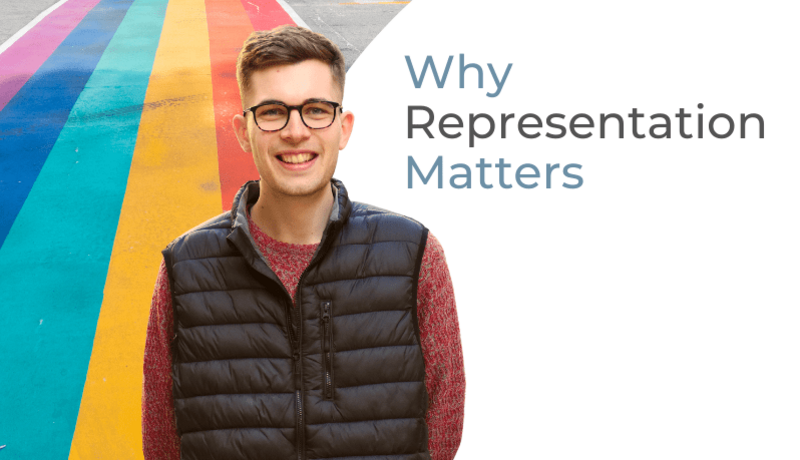Personal Perspectives | Why Representation Matters
Posted on June 2022

As part of Pride month, we heard from Logan Walker, Communications Assistant, about the experience of navigating his identity at school and the difference that representation makes in the lives of LGBTQ+ individuals.
No one wants to be different at school. It’s a disappointing reality that the most formative years of your life are spent suppressing parts of yourself to fit in. Standing out puts a target on your back, and not all attention is positive. As a result, the dawning realisation that I felt the same way about boys as my friends did about girls was kept locked away, even from myself.
Section 28, a law which prohibited ‘the promotion of homosexuality’ by local authorities, had only been repealed a few years before I joined secondary school, and although I didn’t realise it at the time, its effects were heavily felt. Schools were silent on matters of same-sex relationships, and education was strictly heteronormative; the only time I heard the word ‘gay’ was when it was being thrown around as an insult. Without anyone to confide in, I assumed my feelings were an outlier, a phase, and I desperately hoped they would pass away so I could be just like everyone else.
I had no reason to believe my experience was shared. Years later, a friend I knew from school explained that although they knew they were gay from an early age, they deliberately kept it hidden until leaving education; we’d seen each other every day for five years but had both kept silent out of fear. Not only was there no one around to let me know I wasn’t alone, there was nothing I could look to in film or TV to help me understand what I was going through; I had my share of childhood heroes on the screen, but none of them shared my struggle, and healthy same-sex relationships were absent from their narratives.
Without a role model or space to process my feelings, it wasn’t until I was eighteen that I came out, first to myself, and then to close friends and family. Things became a lot clearer once everything was in the open, and I received nothing but positive responses, but years of hiding away left their mark.
This past month – over eight years after coming out – I saw a trailer for Netflix’s Heartstopper, a coming-of-age series about a group of friends navigating queer identities and relationships in a school community that didn’t fully understand. I was hesitant to watch it at first, as it appeared to be another in a long line of stories about an outsider falling for a popular kid out of their league. It turns out it was so much more. The eight-part series explored issues around reconciling personal identities, discovering self-worth, and encountering the backlash that comes with the journey.
It was a show full of warmth in which the characters found safe spaces in each others’ company and confronted their challenges together. Despite the joy I found in watching it, I couldn’t push away a creeping despondency. The show had in many ways mirrored my own story, except that mine was not one of camaraderie and self-discovery, but of isolation and confusion. One thought kept recurring: if I had only watched this ten years ago, things could have been very different.
In a broader sense it made me appreciate why representation is so important. It's easy to become cynical when film and TV appears to regularly feature ‘token’ characters that represent a minority identity, but when I realised the difference it made seeing a part of myself reflected on screen, I became aware of how people from other backgrounds have also been deprived of representation. If all you see in the media are heterosexual, white, able-bodied characters, those who don’t fit this mold will be left feeling excluded from mainstream society and wonder if they are in some way lacking or defective.
It's true that representation can on occasion lack the subtlety and artistry you’d hope for in creative media, but an increasing number of shows such as Schitt’s Creek, Sex Education and It’s a Sin have approached queer representation with the appropriate light and shade that the topic deserves. Outside the world of fiction, the recent news that footballer Jake Daniels had publicly come out as gay was difficult to escape. What made it so newsworthy was not the fact that someone had come out, but rather – given the vast number of players – how few had. Jake’s act of bravery, particularly in an industry with a history of minority players receiving abuse from its fans, will serve as a hope to the many who are still forced to hide away.
Not every step taken for representation has been perfect, but I would rather we stumble towards the light than remain in the darkness of ‘how things have always been’. It’s too late for Heartstopper to transform my teenage years, but I’m grateful to it and similar shows, as well as to courageous individuals, for the difference they make in lives today.
Recent Articles
-
Public Finance Live Conference | Meet Our Delegates
gcjcjcjukiHannah Smith (nee Fritz-Lewis) - Senior ManagerExcited to once again be heading to C...
20 days ago -
Will Pardoe | Improving Offer Acceptance: The Importance of the Interview Experience
Having a strong shortlist of well-qualified candidates is only part of the hiring process; there ...
about 1 month ago -
Case Study: Supporting Trustees of The London Clinic with Critical Interim EBME Engineers
When The London Clinic faced the sudden departure of three in-house EBME Engineers, their leader...
about 2 months ago